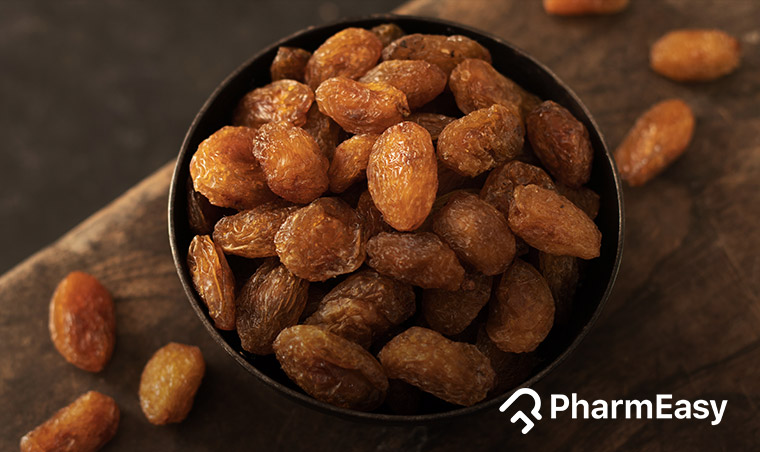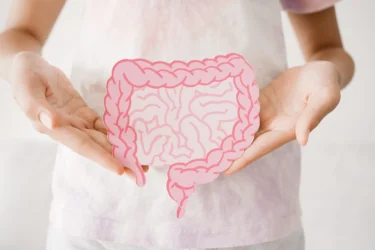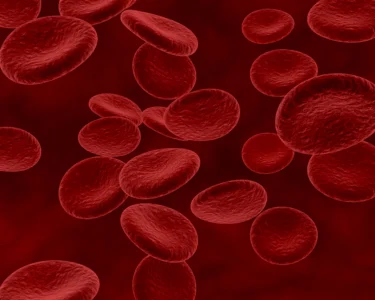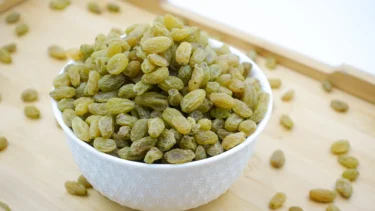Munakka: Benefits, Side Effects, Precautions and More!
By Dr Ashok Pal +2 more

Get,

to manage your symptom
Get your,


4 Cr+ families
benefitted

OTP sent to 9988776655



You’ve successfully subscribed to receive
doctor-approved tips on
Whatsapp

Get ready to feel your best.

Hi There,
Download the PharmEasy App now!!


Register to Avail the Offer
Send OTPBy continuing, you agree with our Privacy Policy and Terms and Conditions

Hi There,
Sign up on PharmEasy now!!
Trusted by 4 crore+ families

OTP sent to 9988776655



You have unlocked 25% off on medicines




Code: NU25
By Dr Ashok Pal +2 more
Table of Contents
Munakka, also called black grape raisins in English, is a fruit with immense value due to its several potential benefits. The leaves, seed, skin of Munakka and the whole fruit contain helpful properties. Munakka is effective in balancing Vata and pitta doshas in the body. Dry grapes or Munakka are packed with nutrients and calories. Munakka (raisins) are initially green in color and darken as they are dried, resulting in a dried, dark-colored fruit having small seeds1.

Munakka is rich in sugars (glucose and fructose), vitamins (ascorbic acid, riboflavin, thiamin, pyridoxine), dietary fibers, and minerals (zinc, phosphorous, iron, magnesium, calcium, potassium). Munakka also contains different types of phytochemicals (plant-derived compounds) like flavonoids, resveratrol, epicatechins, phytoestrogens, and hydrocinnamic acids2. In 100 grams, the below are the nutrients found in munakka3:
I came across a study that shows some awesome anti-ageing wonders of munakka. Compounds called polyphenolics found in foods like munakka might help reverse the effects of ageing on the brain and behaviour. These compounds are like superheroes with antioxidant powers, protecting the organs and tissues from damage caused by oxidative stress. However, studies on humans are needed to validate these claims21.
Dr. Siddharth Gupta, B.A.M.S, M.D (Ayu)
Munakka may show a variety of properties such as4:
Due to its beneficial properties, munakka may have potential use in several health conditions such as:

Munakka contains dietary fiber which helps absorb natural fluids in the body. This adds volume to the food moving down the intestinal tract this may result in regular bowel movements and relief from constipation. The fibers may also help in eliminating harmful toxins from the body3.
Munakka might also be beneficial in improving colon function. Munakka might also have some effect on reducing the risk of colorectal cancer. However, there is a need for further research on humans to suggest the potential uses of Munakka that might benefit in these conditions.
I would recommend munakka for proper digestion and colon health. It was observed that eating raisins may have some positive effects on our digestion and colon health. It might make digested food move through the intestines faster. What’s even cooler is that the levels of bile acids in the faeces, which may be a sign of colon cancer risk, reduced22.
Dr. Rajeev Singh, BAMS

Due to its iron content, munakka could help in anemia. Munakka might also contain vitamin B complex which is required for producing red blood cells5. This information is insufficient; hence more research is required to study the effects of Munakka in managing blood related problems in humans. You must consult your doctor for better advice.

Munakka contains calcium which might help strengthen and remineralize tooth enamel. They might help decrease dental decay. This is due to certain compounds present in munakka that help inhibit oral pathogens. The anti-oxidant nature of munakka can help in eliminating bacteria that are responsible for dental caries and cavities. Munakka also contains antibacterial properties that help prevent dental caries6. Since there are insufficient studies to establish this claim, you must consult a dentist for oral health.

Calcium is the main constituent of bones and is present in munakka. Boron is also a nutrient that is essential for proper bone formation and enhanced calcium absorption. Munakka also contains potassium which may help enhance bone growth, thus potassium, boron and calcium present in munakka, might be helpful in osteoporosis in women5,7. Consult an Ayurvedic doctor before using ginger and only use it if prescribed.

Munakka contains vitamin C and antioxidants that might help to maintain glowing and healthy skin. It also contains antioxidant properties that are helpful in bacterial infections and may also prevent psoriasis and acne8. A dermatologist will be able to guide you better for skin conditions.

Having munakka daily can help you have a head full of lustrous, thick hair due to its vitamin C content. Munakka may also contain anti-inflammatory properties that might be effective against dandruff and irritation9. You can consider to consult a doctor before using it.

Munakka may help lower blood pressure and blood sugar levels resulting in a lower risk of heart disease. The fiber content in munakka might reduce low density or bad cholesterol. Low potassium levels in the body may cause high blood pressure, stroke, and heart disease. Munakka is a good source of potassium and can help improve heart health and prevent these heart conditions10,11. However, any heart condition can be serious and must be properly diagnosed and treated by a doctor.

Due to its composition, munakka ensures a better diet quality, and having it before a meal could help regulate appetite in healthy individuals who have an average weight. Munakka might modulate hormones influencing satiety resulting in reduced hunger and dietary intake which can be useful to maintain a healthy body mass12. However, more research is required to prove such claims. You must contact a nutritionist for advice.

Though there are studies that show the potential uses of dhania in various conditions, these are insufficient and there is a need for further studies to establish the true extent of the benefits of dhania on human health.
Munakka is available in three forms16:
You must consult a qualified doctor before taking any herbal supplements. Do not discontinue or replace an ongoing treatment of modern medicine with an ayurvedic/herbal preparation without consulting a qualified doctor.
Also Read: Phalsa fruit (Grewia asiatica): Uses, Benefits, and Side Effects By Dr. Smita Barode
When taken in large amounts, munakka can result in side effects due to its rich nutrient content17.
Herbs may react differently with everyone we must exercise caution while using munakka.
Also Read: Neem: Uses, Benefits, Side Effects, and More!
Also Read: Camphor: Uses, Benefits, Precautions, Side Effects & More!
Munakka and kishmish contain different nutritional values. Kishmish is yellow in color and Munakka is brown in color. Kishmish does not contain any seeds while Munakka has seeds19.
A diet low in potassium and magnesium might result in acidity. Munakka is a great source of magnesium and potassium. Hence, adding Munakka to your daily diet might help prevent acidity1. However, more research is required to confirm such potential effects of munakka.
Munakka contains a lot of amino acids, vitamins, and minerals like phosphorous which might help in the uptake of other nutrients in the body. Hence, adding Munakka to your diet could enhance your energy and boost your immunity18. More research is needed to validate this fact.
Munakka contains liver protective and regenerative properties. This may be due to its phenolic content20. However, more research is required to confirm such potential effects and consult a doctor for better advice.
The ideal portion of raisins that can be taken for a healthy, balanced like is 40g. This can protect you from type 2 diabetes, hypertension, and cardiovascular diseases21.
Babies can start having Munakka after 18 months. Munakka and other dried fruits are a choking hazard for babies below 12 months of age. It is best to consult a doctor before introducing anything into children’s diet22.
Yes, Munakka could help treat cough due to its cough suppressant activity. It might also help relieve any irritation in the throat. However, more research is required to confirm such potential effects of munakka.
Disclaimer:The information provided here is for educational/awareness purposes only and is not intended to be a substitute for medical treatment by a healthcare professional and should not be relied upon to diagnose or treat any medical condition. The reader should consult a registered medical practitioner to determine the appropriateness of the information and before consuming any medication. PharmEasy does not provide any guarantee or warranty (express or implied) regarding the accuracy, adequacy, completeness, legality, reliability or usefulness of the information; and disclaims any liability arising thereof.
Links and product recommendations in the information provided here are advertisements of third-party products available on the website. PharmEasy does not make any representation on the accuracy or suitability of such products/services. Advertisements do not influence the editorial decisions or content. The information in this blog is subject to change without notice. The authors and administrators reserve the right to modify, add, or remove content without notification. It is your responsibility to review this disclaimer regularly for any changes.
Comments

Leave your comment...
You may also like
Comments